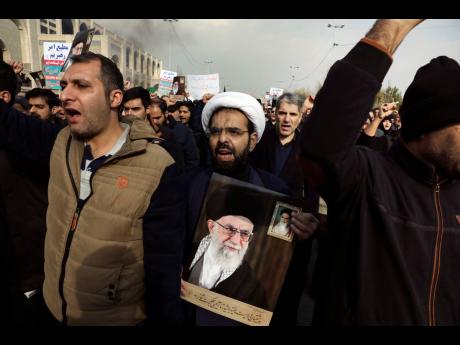Michael Abrahams | Calling out evil
Last week I came across a very disturbing quote on Instagram. It read:
“A man can have sexual pleasure from a child as young as a baby. However, he should not penetrate vaginally, but sodomising the child is acceptable. If a man does penetrate and damage the child then, he should be responsible for her subsistence all her life. This girl will not count as one of his four permanent wives and the man will not be eligible to marry the girl’s sister … . It is better for a girl to marry at such a time when she would begin menstruation at her husband’s house, rather than her father’s home. Any father marrying his daughter so young will have a permanent place in heaven.”
The quote was attributed to Ayatollah Musawi Khomeini, the first supreme leader of Iran. I was repulsed by what I read but have learnt to fact-check information I encounter on the Internet, as there is much misinformation and disinformation in cyberspace. To my horror, not only did I discover that Ayatollah Khomeini really did write that nastiness, but I unearthed even more gems, such as this:
“Intercourse with a woman is not allowed unless she attains the age of nine years, regardless of whether the marriage is permanent or temporary. There is however, no objection in other enjoyments like touching lasciviously, hugging and rubbing the thighs, even with a suckling infant.”
The above quotes are from Khomeini’s book Tahrir al-Wasilah, published in 1986. The book was written as a guide for Shia jurists, and shared Khomeini’s opinions. Simultaneously fascinated and disgusted by what I discovered regarding Khomeini’s views on sexual pleasure with minors, I began to delve deeper into his life. He was Iran’s supreme leader from 1979 until his death in 1989. He founded the Islamic Republic of Iran and was the leader of the Iranian Revolution, which overthrew the dictator Mohammad Reza Pahlavi, also known as the Shah, thereby ending the Iranian monarchy. Khomeini was a true revolutionary, but some of his actions were unjust.
For example, during the 1980-1988 Iran-Iraq War, Khomeini imposed quotas on high schools to produce soldiers, sent children as young as nine years of age to war, and used them as minesweepers and shields for the actual soldiers in his Revolutionary Guards Corps. The children were given “keys to paradise” and promised that they would go directly to heaven if they died as martyrs. Khomeini declared that parental permission was unnecessary for those going to the front. Iranian officers captured by Iraqi forces claimed that nine out of 10 Iranian child soldiers were killed. It has been estimated that approximately 95,000 Iranian children lost their lives during the conflict.
SATANIC VERSES
Then there is the ‘Satanic Verses’ debacle. Salman Rushdie, an Indian-British novelist, published the book The Satanic Verses in September 1988. The book was banned in several Muslim countries and triggered violent protests. After six people were killed in Pakistan on February 12, 1989, Ayatollah Khomeini issued a fatwa (a ruling on a point of Islamic law) that condemned Rushdie, along with any of the editors and publishers of his book in any language, to death. He decreed, “I call on all valiant Muslims, wherever they may be in the world, to kill them without delay, so that no one will dare insult the sacred beliefs of Muslims henceforth.”
In 1991, Ettore Capriolo, the Italian translator of The Satanic Verses, was stabbed, but survived the attack. Days later, the Japanese translator, Hitoshi Igarashi, was stabbed to death. In 1993, William Nygaard, who published the book in Norway, was shot, but survived. On August 13, 2022, Rushdie was attacked by Hadi Matar, a Lebanese-American, and stabbed in the face, neck and abdomen. Rushdie survived, and Matar was arrested and charged with attempted murder.
Interestingly, while conducting my online research on Khomeini, I came across a story that broke just the day before and was creating waves in the Muslim world. An Indian publishing house produced a sixth-grade school textbook that lists Khomeini as one of the “most evil men in history”. The book sparked an outcry from India’s Shia Muslim community, forcing the publishers to offer an apology and withdraw it. Some of the reasons given for Khomeini’s depiction as evil are debatable. For example, it lists him as the “culprit behind the Iranian Revolution and the Iran-Iraq war”. To be honest, during the Iranian Revolution, a corrupt dictator was overthrown, and it was Iraq that started the Iran-Iraq War. However, in my opinion, advocating the rape of children and sending them into war as shields, ordering the murder of the author of a book because you find it offensive, and committing a host of other human-rights violations is morally reprehensible and wicked. In other words: “evil”.
What I find interesting about this situation is that one should feel the need to apologise when one makes statements or expresses opinions that may offend religious folks, even when the facts are staring you in the face. This is one aspect of religion that is cause for concern. There is no rational reason why religion, or religious leaders, should be given a free pass and be above criticism. For example, Ayatollah Khomeini was considered “inviolable”, and Iranians have been punished for questioning or insulting him. However, some religious practices and edicts by religious leaders place people’s lives and well-being at risk, and we should be able to call them out without fear of being rebuked or even physically assaulted, especially if they are perverse or ‘evil’.
Michael Abrahams is an obstetrician and gynaecologist, social commentator and human-rights advocate. Send feedback to columns@gleanerjm.com and michabe_1999@hotmail.com, or follow him on X , formerly Twitter, @mikeyabrahams.

